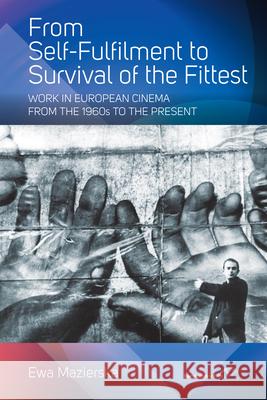From Self-fulfilment to Survival of the Fittest: Work in European Cinema from the 1960s to the Present » książka
From Self-fulfilment to Survival of the Fittest: Work in European Cinema from the 1960s to the Present
ISBN-13: 9781782384861 / Angielski / Twarda / 2015 / 312 str.
From Self-fulfilment to Survival of the Fittest: Work in European Cinema from the 1960s to the Present
ISBN-13: 9781782384861 / Angielski / Twarda / 2015 / 312 str.
(netto: 491,88 VAT: 5%)
Najniższa cena z 30 dni: 498,70 zł
ok. 22 dni roboczych.
Darmowa dostawa!
"Ewa Mazierska has written an important book... it] is original and fascinating scholarship. The range of films is broad, with a special emphasis on British, former Yugoslav, Polish and French cinema, and the book cuts across art house and popular cinema - from cult films to Carry On- all in the name of bringing our attention to one of cinema's otherwise most notable absent figures: work and working." - William Brown, University of Roehampton Contrary to the assumption that Western and Eastern European economies and cinemas were very different from each other, they actually had much in common. After the Second World War both the East and the West adopted a mixed system, containing elements of both socialism and capitalism, and from the 1980s on the whole of Europe, albeit at an uneven speed, followed the neoliberal agenda. This book examines how the economic systems of the East and West impacted labor by focusing on the representation of work in European cinema. Using a Marxist perspective, it compares the situation of workers in Western and Eastern Europe as represented in both auteurist and popular films, including those of Tony Richardson, Lindsay Anderson, Jean-Luc Godard, Andrzej Wajda, DusanMakavejev, Jerzy Skolimowski, the Dardenne Brothers, Ulrich Seidl and many others. Ewa Mazierska is Professor of Film Studies at the School of Journalism and Media, University of Central Lancashire. Her publications include European Cinema and Intertextuality: History, Memory, Politics (Palgrave Macmillan, 2011), Jerzy Skolimowski: The Cinema of a Nonconformist (Berghahn, 2010), Masculinities in Polish, Czech and Slovak Cinema (Berghahn, 2008) and with Laura Rascaroli, Crossing New Europe: The European Road Movie (Wallflower, 2006) and From Moscow to Madrid: Postmodern Cities, European Cinema (I.B. Tauris, 2003). She is principal editor of the journal Studies in Eastern European Cinema.
"Ewa Mazierska has written an important book...[it] is original and fascinating scholarship. The range of films is broad, with a special emphasis on British, former Yugoslav, Polish and French cinema, and the book cuts across art house and popular cinema - from cult films to Carry On- all in the name of bringing our attention to one of cinemas otherwise most notable absent figures: work and working." · William Brown, University of RoehamptonContrary to the assumption that Western and Eastern European economies and cinemas were very different from each other, they actually had much in common. After the Second World War both the East and the West adopted a mixed system, containing elements of both socialism and capitalism, and from the 1980s on the whole of Europe, albeit at an uneven speed, followed the neoliberal agenda. This book examines how the economic systems of the East and West impacted labor by focusing on the representation of work in European cinema. Using a Marxist perspective, it compares the situation of workers in Western and Eastern Europe as represented in both auteurist and popular films, including those of Tony Richardson, Lindsay Anderson, Jean-Luc Godard, Andrzej Wajda, DušanMakavejev, Jerzy Skolimowski, the Dardenne Brothers, Ulrich Seidl and many others.Ewa Mazierska is Professor of Film Studies at the School of Journalism and Media, University of Central Lancashire. Her publications include European Cinema and Intertextuality: History, Memory, Politics (Palgrave Macmillan, 2011), Jerzy Skolimowski: The Cinema of a Nonconformist (Berghahn, 2010), Masculinities in Polish, Czech and Slovak Cinema (Berghahn, 2008) and with Laura Rascaroli, Crossing New Europe: The European Road Movie (Wallflower, 2006) and From Moscow to Madrid: Postmodern Cities, European Cinema (I.B. Tauris, 2003). She is principal editor of the journal Studies in Eastern European Cinema.











